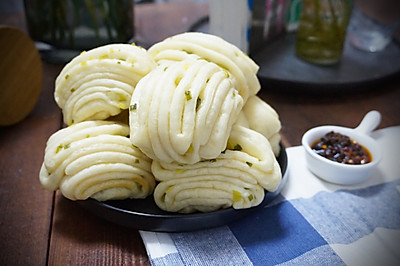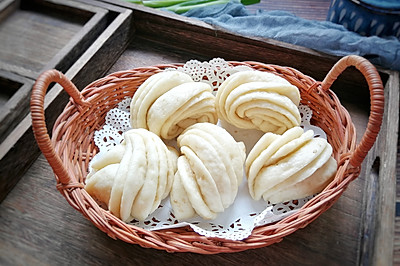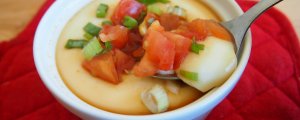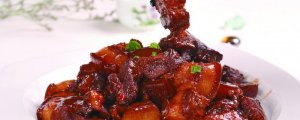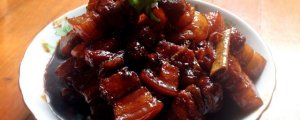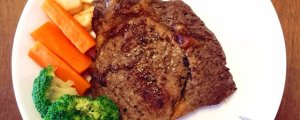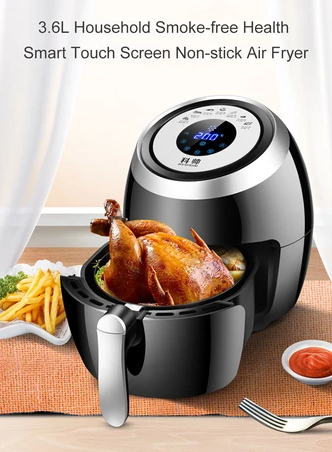
Spicy flower roll course
(154623 views)
I used to make pasta with several important pits - collapse, hardness and acid. After many failures, pasta was once a difficult thing for me. This is not. Before and after learning for a few years. Also went to cooking school serious study. Also took a certificate. As a result, I found that in order to solve the problem of pasta, I had to do more, observe more and think more. There was no way to be lazy and easy. It should be noted that there is basically no problem with cold water and noodles in summer, but it is better to use warm water and noodles in winter, so as to better promote dough fermentation. -
Cooking ingredients
Cooking Steps

Step1:Yeast - the ratio of yeast and flour. It is generally 1-200. If 500g flour is about 2.5G yeast, it can be increased a little if the weather is cold. I used 3 grams of yeast today) warm water - the water temperature is 3040 degrees. It's hand warm. It can't be scalded. The proportion of water and flour is 1-2.500g. The flour is about 250g. The shallot is sprinkled on the dough. So the demand is a little bit more edible oil. This time, I use linseed oil imported from Canada. Generally, linseed oil is not suitable for high-temperature cooking. This time, I brush it into the dough. The nutrition of linseed oil is better preserved.) hot sauce - this time, I use mayonnaise, the best sauce in small red sauce. Don't It's red. It's not spicy. It's made of the yolk of Guangxi sea duck eg

Step2:Add warm water and yeast into flour and knead into smooth doug

Step3:Take the dough out. Rub it and exhaust. And then split it in tw

Step4:Rolling out into rectangle is generally rolling out into a circle for making pancakes. It's not the same for making rolls. It's Square. It's good for the shape of dough when it's stacked together. (you can push the corner with the help of a rolling pin. Slowly arrange the square. The thickness is about 0.5c

Step5:The purpose of oiling is to steam. Dough doesn't stick together

Step6:That's why the scrolls can be easily pulled one by one. A thin layer can be applied.

Step7:Sprinkle salt and scallion. Sprinkle scallion well. Don't worry. Then press it slightly with your hand. Let the scallion into the dough as much as possible.

Step8:How much hot sauce do you choose according to your tast

Step9:Fold 1 / 3 of the first edge. Fold from bottom to to

Step10:Fold the second edge. Cover the top edge to the botto

Step11:I measured the even and even segments. The spacing of about 2.53cm is suitable. You have to be even. Otherwise, you will be single if you have doug

Step12:Stack the second dough on top of the first, the fourth on top of the third, and so on (after stacking, let it stand for 5 minutes, so it's easier to stretch

Step13:Press the dough with chopsticks until the dough is turned ove

Step14:It takes a little skill to turn the dough. Take the dough. Pull it to the left and right sides to the original length of 1 time. Then pinch it with your left han

Step15:

Step16:

Step17:
Cooking tips:In fact, there are two main problems for beginners to make pasta. After solving them, making pasta is the beginning. 1. The most common reason why dough can't grow is that the quantity of yeast is not enough. For every 500g of flour (about 1L by volume), it is necessary to add yeast powder with one bottle cap of common mineral water bottle cap. Of course. Different brands of yeast have different activity. The yeast powder with better activity can be used less. The yeast powder with poor activity should be used more. Master flexibly. My common yeast is Angel yeast. The ratio is to add 1 bottle of yeast powder (about 23g) per 500g of flour. When it's cold, add more yeast. When it's hot, add less yeast. Yeast can be directly mixed into flour, but if the activation step is added in advance (put yeast in a small bowl, add a small amount of white sugar, add a proper amount of warm water of 3040 degrees, mix until the white sugar melts, then stand for a while, wait for the surface
 Chinese Food
Chinese Food
